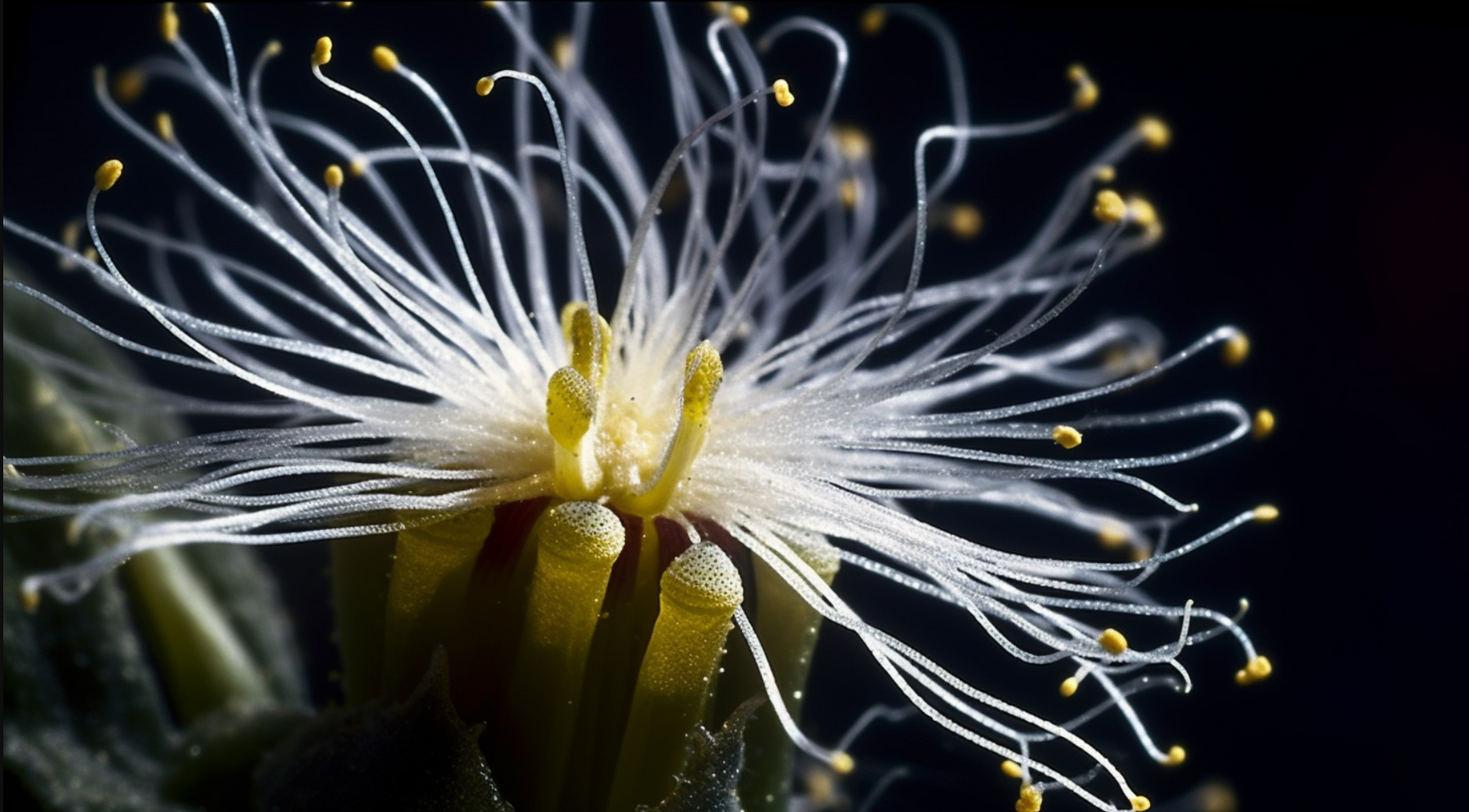
Mesembrine: Uncovering the Therapeutic Potential of the Sceletium tortuosum Alkaloid for Mental Health
Mesembrine is a fascinating compound that has been gaining attention in recent years for its potential therapeutic uses. In this article, we will delve into the origins, chemical properties, and pharmacological effects of mesembrine, as well as explore its benefits, dosage guidelines, side effects, and current research. So, let's dive right in and learn more about this intriguing substance.
What is Mesembrine?
Mesembrine is an alkaloid compound found primarily in the Sceletium tortuosum plant, also known as Kanna or Channa. It has been used for centuries by indigenous people in South Africa for its mood-enhancing and stress-reducing properties. Recent scientific research has revealed its potential as a natural remedy for various mental health issues, including anxiety, depression, and addiction.

Origins and Sources of Mesembrine
Sceletium tortuosum
Sceletium tortuosum, the primary source of mesembrine, is a succulent plant native to South Africa. It has been used by the indigenous San and Khoi people for centuries as a natural remedy for stress, anxiety, and fatigue. The plant is typically consumed by chewing the leaves, brewing it as a tea, or even inhaling its powdered form.
Traditional Use
Historically, mesembrine-rich Kanna was utilized during long hunting trips to stave off hunger, thirst, and fatigue. It was also used in rituals and social gatherings for its mood-enhancing and anxiety-reducing effects. In more recent times, the traditional use of Kanna has gained recognition for its potential therapeutic applications.

Chemicals Structure and Properties
Mesembrine is a structurally unique indole alkaloid, characterized by a bicyclic structure containing an indole and a pyrrolidine ring. It is one of several active alkaloids found in Sceletium tortuosum, along with mesembrenone, mesembrenol, and mesembranol. The presence and concentration of these alkaloids may vary depending on the plant's age, growth conditions, and harvesting techniques.
Pharmacological Effects
Serotonin Reuptake Inhibition
Mesembrine's primary mode of action is as a serotonin reuptake inhibitor (SRI), meaning it increases the availability of serotonin in the brain by preventing its reabsorption into neurons. This mechanism is similar to that of many conventional antidepressant medications, such as selective serotonin reuptake inhibitors (SSRIs) and serotonin-norepinephrine reuptake inhibitors (SNRIs).
PDE4 Inhibition
In addition to its SRI activity, mesembrine has been shown to inhibit the enzyme phosphodiesterase-4 (PDE4). This inhibition leads to increased levels of cyclic adenosine monophosphate (cAMP) in the brain, which is thought to contribute to its antidepressant and anxiolytic effects. PDE4 inhibitors have also been investigated for their potential to improve cognitive function and reduce inflammation.

Benifits and Therapeutic Effects
Anxiety and Depression
Due to its serotonin reuptake inhibition and PDE4 inhibition properties, mesembrine has demonstrated potential as a natural treatment for anxiety and depression. Several studies have reported its effectiveness in reducing symptoms of anxiety, stress, and depression, with some suggesting it may be as effective as conventional antidepressant medications.
Stress Reduction
Mesembrine's anxiolytic and mood-enhancing properties make it an attractive option for individuals seeking a natural remedy to manage stress. Traditional use of Kanna in South Africa supports its potential in alleviating stress and promoting relaxation.
Cognitive Enhancement
Research into the cognitive-enhancing effects of mesembrine is limited but promising. Some studies suggest that its PDE4 inhibition may improve cognitive function by increasing cAMP levels in the brain, which play a role in memory formation and synaptic plasticity.
Addiction and Cravings
Preliminary research has shown that mesembrine may help reduce cravings and withdrawal symptoms in individuals struggling with addiction, particularly to substances such as nicotine and alcohol. Further research is needed to fully understand its potential in addiction treatment.

Dosage and Administration
There is no universally accepted dosage for mesembrine, as individual responses may vary. However, a typical starting dose ranges from 30-100 mg of a standardized extract, taken 1-2 times daily. It is essential to start with a low dose and gradually increase as needed, monitoring for any side effects or interactions with other medications.
Side Effects and Safety
Mesembrine is generally considered safe when used appropriately and in moderate doses. However, some individuals may experience side effects such as nausea, dizziness, dry mouth, and headache. It is crucial to consult with a healthcare professional before beginning any new supplement, especially if you are pregnant, breastfeeding, or taking other medications.
Interactions with Other Medications
Although mesembrine is thought to have a low risk of drug interactions, it may interact with certain medications due to its serotonin reuptake inhibition properties. Individuals taking SSRIs, SNRIs, monoamine oxidase inhibitors (MAOIs), or other serotonergic medications should consult with a healthcare professional before using mesembrine to avoid the risk of serotonin syndrome.
Legal Status and Availability
The legal status of mesembrine varies by country. In some regions, it is available as a dietary supplement or herbal remedy, while in others, it may be regulated or restricted. It is essential to familiarize yourself with the laws governing mesembrine in your jurisdiction before purchasing or using it.
Research and Clinical Studies
While there is a growing body of research on the potential therapeutic uses of mesembrine, further investigation is needed to confirm its efficacy and safety. Current research is limited by small sample sizes, and more extensive, well-controlled clinical trials are necessary to establish optimal dosages and administration guidelines.

Conclusion
Mesembrine is an intriguing compound with a rich history of traditional use and promising potential as a natural remedy for anxiety, depression, stress reduction, and cognitive enhancement. Although further research is required to determine its full range of therapeutic applications, its unique pharmacological properties and safety profile make it an attractive option for individuals seeking a natural approach to mental health support.
FAQs
Q.1 What is the primary source of mesembrine?
Mesembrine is primarily derived from the Sceletium tortuosum plant, also known as Kanna or Channa, native to South Africa.
Q.2 How does mesembrine work in the brain?
Mesembrine acts as a serotonin reuptake inhibitor (SRI) and a phosphodiesterase-4 (PDE4) inhibitor, increasing the availability of serotonin and cyclic adenosine monophosphate (cAMP) in the brain, respectively. These mechanisms contribute to its antidepressant, anxiolytic, and potential cognitive-enhancing effects.
Q.3 Is mesembrine safe to use?
Mesembrine is generally considered safe when used appropriately and in moderate doses. However, some individuals may experience side effects, and it may interact with certain medications. It is essential to consult with a healthcare professional before using mesembrine, especially if you are pregnant, breastfeeding, or taking other medications.
Q.4 Can mesembrine help with addiction?
Preliminary research has shown that mesembrine may help reduce cravings and withdrawal symptoms in individuals struggling with addiction, particularly to substances such as nicotine and alcohol. However, further research is needed to fully understand its potential in addiction treatment.
Q.5 Is mesembrine legal?
The legal status of mesembrine varies by country. In some regions, it is available as a dietary supplement or herbal remedy, while in others, it may be regulated or restricted. It is essential to familiarize yourself with the laws governing mesembrine in your jurisdiction before purchasing or using it.

References
- Smith, M. T., et al. (1996). Psychoactive constituents of the genus Sceletium N.E.Br. and other Mesembryanthemaceae: a review. Journal of Ethnopharmacology, 50(3), 119-130. Link
- Patnala, S., & Kanfer, I. (2009). Investigations of the phytochemical content of Sceletium tortuosum following the preparation of “Kougoed” by fermentation of plant material. Journal of Ethnopharmacology, 121(1), 86-91. Link
- Terburg, D., et al. (2013). Acute effects of Sceletium tortuosum (Zembrin), a dual 5-HT reuptake and PDE4 inhibitor, in the human amygdala and its connection to the hypothalamus. Neuropsychopharmacology, 38(13), 2708-2716. Link
- Nell, H., et al. (2013). A randomized, double-blind, parallel-group, placebo-controlled trial of Extract Sceletium tortuosum (Zembrin) in healthy adults. Journal of Alternative and Complementary Medicine, 19(11), 898-904. Link
- Chiu, S., et al. (2014). Proof-of-concept randomized controlled study of cognition effects of the proprietary extract Sceletium tortuosum (Zembrin) targeting phosphodiesterase-4 in cognitively healthy subjects: implications for Alzheimer’s dementia. Evidence-Based Complementary and Alternative Medicine, 2014. Link
- Gericke, N., & Viljoen, A. M. (2008). Sceletium—a review update. Journal of ethnopharmacology, 119(3), 653-663. Link
- Coetzee, D. D., López, V., & Smith, C. (2016). High-mesembrine Sceletium extract (Trimesemine™) is a monoamine releasing agent, rather than only a selective serotonin reuptake inhibitor. Journal of ethnopharmacology, 177, 111-116. Link

Leave a comment